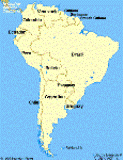Latin America, Spain demand more presence in global finance
 San Salvador, El Salvador (dpa) - Latin America and Spain on Thursday at the 18th Iberian American Summit in San Salvador demanded a greater presence in global financial decisions at a time of crisis.
San Salvador, El Salvador (dpa) - Latin America and Spain on Thursday at the 18th Iberian American Summit in San Salvador demanded a greater presence in global financial decisions at a time of crisis.
Spain, Brazil, Mexico, Chile and Argentina, among other countries, called for a fairer multilateral world order that would take into account the views of emerging countries in the face of a crisis that developed in industrialized nations and threatens to hit developing countries particularly hard.
"The crisis has made the under-representation of emerging economies in the governing of multilateral credit institutions unsustainable," said Chilean President Michelle Bachelet.
Bachelet promoted a special declaration on financial turbulences that the summit is set to sign on Friday.
She said the current condition of the world economy has exposed "the absence of an active role from international institutions created in Bretton Woods," referring to the International Monetary Fund (IMF) and the World Bank.
She further stressed that reform "must include the views and the vision of emerging and developing countries."
A model that was believed "indestructible" has failed, said Argentine President Cristina Fernandez de Kirchner, while Brazil's Luiz Inacio Lula da Silva pointed out that global financial institutions failed to predict the current crisis.
Spanish Prime Minister Jose Luis Rodriguez Zapatero said any redefinition of the role of the IMF and other organizations must reflect "the new geopolitical reality." To his great displeasure, Zapatero has not been invited to the emergency economic summit of the G-20 that the United States is hosting in Washington on November 15.
"This crisis cannot be tackled without an effort of international coordination, and effort which would be unfair if it did not count on the participation of developing countries," Lula said.
"It is necessary to refound the mechanisms of global governance with a greater participation from developing countries. We cannot accept a decision-making process which practically excludes us," he said.
Bolivian President Evo Morales, a left-wing populist, noted that "some want to save capitalism." He stressed, however, that capitalism, with its faults in the fields of the economy, energy and the environment, "will never be useful for development." In this context, he too called for a democratization of the world economy.
Mexican President Felipe Calderon said the current crisis sprung from the false premise that financial systems can regulate themselves and from excessive risk-taking.
"They say it is the worst crisis since 1929. It's true, with the difference that in 1929 there was no global economy like the one we have now," he noted.
Calderon called for the creation of a new international order that allows for a balanced design between the market and the state, with much more strict supervision and regulation.
He further said that Latin America needs to ensure that it will remain on the receiving end of investment flows, by becoming more attractive than other regions around the world. In this context, he called for greater regional economic integration.
"Latin America today has to consume Latin American products, to be able to integrate our markets much faster," he said.
"We need Iberian America to support Iberian America," Calderon stressed.
The 18th Iberian American Summit was discussing a draft declaration on the global economic outlook that blamed industrialized countries for the crisis and expressed the region's commitment to protecting jobs, investment and credit.
Further, it made a call to keep promoting social policies and demanded the urgent success of the Doha Round of talks at the World Trade Organization (WTO). (dpa)